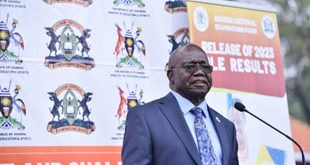
Kampala, Uganda | THE INDEPENDENT | On June 13th, the Federation of Uganda Football Association- FUFA banned 13 individuals, after successfully uncovering a South African-based match-fixing syndicate with the help of the Federation of International Football Associations- FIFA.
Among those banned were one player, Latif Kiyemba, formerly of Lugazi FC; two administrators, Kongola Ahmed, and Epieru Richard; and ten referees. They were handed provisional 90-day bans by FUFA on June 13.
The incident adds to the growing list of players banned by FUFA over the past three to four years due to match-fixing since the federation embarked on curbing the growing vice of match-fixing, a crackdown that has significantly impacted the careers of many young, whose football careers are ultimately jeopardized.
In May 2023, FUFA banned six players Waiswa Andrew and Kakooza Yaya Mahad, who played for former Uganda Premier League club Gaddafi FC, Lwesibawa Godfrey, who played for Kitara FC, Maganda Saleh, who played for Calvary FC, Oringa Franco, who played for Northern Gateway FC, and Mwima Abdallah, who played for Ndejje FC University. FIFA eventually extended their ban this month
Despite some players, like Lwesibawa, claiming innocence, FUFA’s investigations have often proven otherwise. Players are frequently targeted by match-fixers to manipulate games and place substantial bets.
Investigations noted that match-fixers often target lower-tier matches due to the absence of television cameras, making it easier to manipulate games and place substantial bets.
FUFA’s legal manager Denis Lukambi said that 99% of match-fixing is betting-related with match-fixers placing money either in local [Ugandan] betting houses or, more especially, out of the country, and using players and referees to execute what they placed their bets on. He cited an example where a referee awarded two fake penalties in the first half of a game, as directed by a match-fixer who had placed bets on those exact outcomes.
A source, who preferred anonymity said many players from lower-division players are vulnerable to match-fixing due to inadequate club support, therefore with the lure of large sums of money from fixers, players often succumb to these unethical deals.
In 2022 when FUFA banned two officials and a Kawoowo sports journalist over match-fixing, URN spoke to James Kaweesa, a local football coach who was implicated in the case. He confessed how one of his friends based in Sweden approached him when he wanted to manipulate a Uganda Cup game between Tooro United and Five Stars FC.
Kaweesa told URN that the only way he could his friend’s deal to go through is getting a player who was part of either of the teams to lead action on the playing pitch.
“I have a friend of mine who stays in Sweden, he called me and told me he wanted to bet a game between Totoro United and Five Stars, but he told me to look for any player from Five-stars Entebbe whom he could compromise,” Kaweesa briefly explained.
“I started looking for a player and after doing some research, I got to know that there is a player who has been involved in match-fixing before, his name is Jackson Kigozi who is the goalkeeper for the Five Stars FC, immediately I got his contacts and I talked to him on the phone about the matter, he accepted and asked for 800,000 Shillings” Kaweesa earlier told URN
Charles Twine Member and Chief Investigator-FUFA Investigatory Chamber, speaking last week noted that although match-fixing hurts players who are implicated, it primarily affects supporters who frequently attend stadiums to support their clubs, hoping for a fair game, unaware that some of the players are at the forefront of helping the vice rise in Uganda’s football business.
How match-fixing was detected
Seven games across the second divisions of both men’s and women’s football in the East African country were adjudged to have been targeted by the fixing ring between October and December last year.
These games included Kigezi Homeboyz Vs Kyetume FC played on 12/10/2023, Kaaro Karungi FC Vs Calvary FC played on 12/10/2023, Rines SS WFC Vs Kawempe Muslim Ladies FC 15/10/2023, Asubo Gafford Ladies FC Vs She Maroons FC 15/10/2023, Jinja North United FC Vs Kyetume FC on 29/10/2023, Blacks Powers FC Vs Lugazi FC on 02/11/2023, and Kyetume FC Vs Ndejje University FC 16/11/2023.
According to a statement released earlier by the local FA, the investigation that implicated the 13 individuals revealed that several referees, club officials, and players were approached and bribed by the match-fixers concerning the manipulation of the results in the matches.
“Under Article 78 of the FUFA Ethics and Disciplinary Code 2023, Internal investigations into the matter commenced and the investigations have since revealed that a match-fixing syndicate based in South Africa was responsible for and financed the plot to manipulate the matches,” reads part of the statement released by FUFA.
According to FUFA, the operation on behalf of the match-fixing syndicate was led by one Hilfiger Mutyaba alias Chelsea an ex-convict who was charged, convicted, and sentenced in the Virgin Islands for financial-related crimes, and other local criminal elements.
“Hilfiger Mutyaba alias Chelsea and his accomplices recruited Referee Kaddu Ali who was tasked with approaching and recruiting club officials, players, and referees on behalf of the match-fixers for purposes of involving them in the fixing of matches.,” reads part of the statement
This is one of the fruits received from the collaboration FUFA recently formed with Sportrada, a sports technology company to aid the Federation in gathering and examining football data for the top-tier Uganda Premier League and other active leagues in Uganda in a bid to unearth any instances of match manipulation.
Speaking at a press conference last week, Lukambi said that through the systems put in place with FIFA and sports data company Sportradar enabled FUFA to detect the fixing, they received an alert that someone had placed abnormal money on a particular game which he didn’t mention and that’s what led their investigations.
Meanwhile, it should be noted that Match-fixing became a criminal offense last year in Uganda when President Yoweri Museveni signed into law the National Sports Act, which criminalized it.
*****
URN
 The Independent Uganda: You get the Truth we Pay the Price
The Independent Uganda: You get the Truth we Pay the Price


